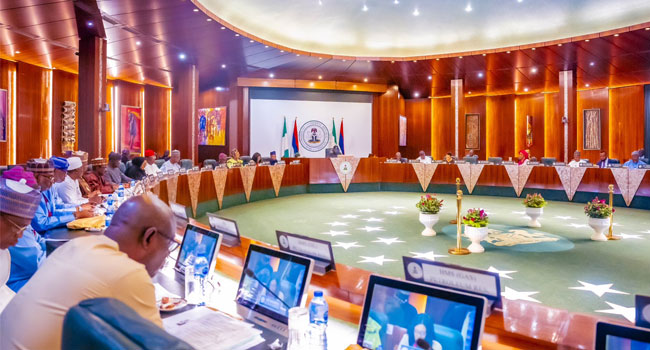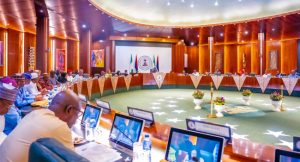
2025 BUDGET: FG TO BORROW N13.8TRN

The Federal Executive Council (FEC) yesterday approved a budget proposal of N47.9 trillion for the 2025 fiscal year and borrowing of N13.8 trillion.
The Minister of Budget and Economic Planning, Atiku Bagudu, disclosed this while briefing State House correspondents, at the end of the Council meeting, presided over by President Bola Tinubu at the Presidential Villa, Abuja.
The approval is part of the Medium Term Expenditure Framework, MTEF, and Fiscal Strategy Paper, for 2025-2027, by the Fiscal Responsibility Act of 2007.
The framework is expected to be submitted to the National Assembly as required by law, either on Friday or Monday.
Bagudu outlined several key parameters that will guide the 2025 budget based on economic projections and government priorities. These include a projected Gross Domestic Product (GDP) growth rate of 4.6% for 2025, an oil price benchmark of $75 per barrel and an exchange rate of N1.400 to $1.
Additionally, the government anticipates oil production at 2.06 million barrels per day.
In terms of fiscal strategy, the budget assumes that the government will borrow approximately N13.8 trillion — about 3.87% of the GDP — to fund key infrastructure projects and economic initiatives.
Bagudu emphasized that this borrowing is part of a strategic plan to balance government spending with sustainable debt management
The Minister further noted that “the Nigerian economy is showing signs of resilience, with a 3.19% growth rate recorded in the second quarter of 2024.
This growth is expected to continue through 2025, driven by efforts to tackle inflation and stabilize key economic sectors.”
Bagudu lists the aims of fiscal policies
He stressed that the Federal Government’s fiscal policies are aimed at strengthening economic resilience, continuing to address inflationary pressures, and providing more targeted support to drive long-term growth.
Bagudu also highlighted that the implementation of the 2024 budget was progressing well, with significant improvements in revenue collection and expenditure management, despite some delays in achieving pro-rated targets.
“Non-oil revenue streams, in particular, have performed better than initially expected, showing promising progress.
The N47.9 trillion proposed budget for 2025 includes various provisions, particularly in areas such as infrastructure development, social programs, and critical national projects.
Bagudu also revealed that for the first time, the government’s budget will include contributions to the development commissions that had recently been passed or were in the process of being passed by the National Assembly.
“These measures are designed to strengthen the country’s social and economic development at the grassroots level.”
He further noted that the federal government is committed to ensuring that the 2025 budget is passed and signed into law before December 2024, in order to create a predictable fiscal environment and adhere to the January-December budget circle that the administration aims to implement moving forward.
In addition to approving the 2025 budget, the FEC also endorsed the 2025-2027 Medium Term Expenditure Framework, MTEF, and Fiscal Strategy Papers, FSP, which outline the government’s long-term fiscal policies and strategies for achieving sustainable growth.
These documents will now be sent to the National Assembly for further review.
Bagudu emphasized that the MTEF and FSP provided the necessary roadmap for the government’s fiscal policy over the next three years, ensuring that public finances remained on a sound footing and that economic growth targets were met.
He stressed that the government’s macroeconomic policies, particularly in the areas of market-driven pricing for petroleum products and foreign exchange, are contributing to the country’s overall economic stability.
“The fiscal efforts are on track, and we are confident that with these strategic investments and reforms, Nigeria will continue to make progress toward a more resilient and sustainable economy,” he declared.
Experts fault govt’s budget assumptions
Economy experts who spoke to newsmen, however, faulted the budget assumptions, describing some of them as too aggressive.
In his comment, David Adonri, Analyst and Executive Vice Chairman at Highcap Securities Limited said : “One thing that bothers me is the failure of FGN to attach a report of the performance of the previous budget while seeking for approval of the new budget.
“Historical antecedents will let us know whether the assumptions underlying the new budget are reasonable.
“How will FGN finance the budget? Is it still a deficit budget like on previous occasions? There is nothing on ground to indicate that GDP growth rate of 4.6% is attainable in 2025.
“The omission of the forecast for inflation is questionable because the intended GDP growth may just be an inflationary growth which is akin to motion without movement.
“With Donald Trump’s agenda to release more fossil fuel from 2025, the crude oil price forecast may be misleading.
‘Finally, predicating the budget on a crude oil-driven economy shows that budgeting by FGN has not departed from past ruinous economic philosophy.
“It is too pedestrian for a country that should be inward-looking and focused on the mobilization of the idle factors of production in the country.”
On his part, Tunde Abidoye, Head of Equity Research FBNQest Securities Limited, said: “I think that some of the assumptions are a bit aggressive.
“The oil production benchmark of 2.06mbpd looks very ambitious given the current realized oil production level of around 1.3mbpd (ex-condensates), per NUPRC data.
“The exchange rate and GDP growth rate projections are also a bit optimistic given the current exchange rate is N1,650, and the strain on household wallets.
“However, although I think the oil price benchmark is realistic, there are potential downside risks arising from the anticipated ramp up of oil production by the US following President Trump’s victory at the polls.”
Also commenting, Clifford Egbomeade, Public Affairs Analyst/ Communications Expert, said: “The proposed 2025 budget of N47.9 trillion, based on a $75 oil benchmark, 2.06 mbd production, and 4.6% GDP growth, sets ambitious targets given Nigeria’s economic climate.
“The oil production target assumes steady output levels, which may be impacted by infrastructure limitations. Moreso, the projected 4.6% GDP growth may be optimistic, as Nigeria continues to face high inflation, currency pressures, and unemployment.
“The budget includes N9.22 trillion in new borrowing, raising concerns about fiscal sustainability given the nation’s current debt servicing load. “The assumed exchange rate of N1,400 per dollar suggests continued devaluation, which could intensify inflationary pressures. Achieving this budget will require effective fiscal reforms and greater economic diversification to meet revenue and growth targets.”
Dissecting the proposed budget, Port Harcourt-based energy analyst, Dr. Bala Zakka, said: “Oil market is very volatile and absolute caution should be taken in the process of taking the benchmark price for the 2025 budget.”
On output, he said: “The federal government said it is currently producing 1.8 million barrels per day, including condensate. Like in the case of price, adequate caution should also be taken here. I strongly believe that stakeholders, including the government and investors should work harder to further increase the nation’s capacity to produce oil and gas.”
“The Gross Domestic Product, GDP, is all about the production of goods and services in an economy. With constant power supply disruptions, it has not been possible for households and businesses to participate in the economy. It is very doubtful if they will be able to increase investment to produce goods and services in 2025.”
